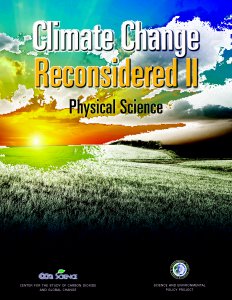
The Heartland Institute recently conducted a mass mailing to K-12 and college teachers promoting its new “Climate Change Reconsidered” report. Heartland encouraged teachers to read the summary of the report and “use that work to inform your thinking—and your students—on this important issue.” What is this exactly?
Heartland’s report was written under the auspices of the “Nongovernmental International Panel of Climate Change” (NIPCC). If you read that sentence too quickly, you could easily confuse it with the UN’s Intergovernmental Panel on Climate Change (IPCC). That confusion is intentional.

The IPCC was founded in 1988 to bring together the world’s top climate researchers—it’s like The Avengers for science—and have them summarize the current state of knowledge about how climate is changing. The IPCC’s fourth assessment report earned the organization a Nobel Prize, won jointly with Al Gore in 2007. The IPCC’s fifth assessment report is currently being released in sections.
This Heartland NIPCC report presents an alternative reality for climate science. Just as Conservapedia offers its readers comforting information reinforcing predetermined views, the NIPCC gives self-styled climate “skeptics” a fig leaf for their rejection of standard science. While the IPCC analyzes the issue using relevant peer-reviewed science, the NIPCC offers the tiniest slice of information possible, cherry-picked factoids out of context and without regard to the overall picture.
The danger in the Heartland Institute's mass mailing is that some K-12 teachers may mistake what they see for real science. K-12 teachers teach a wide range of subjects in which they have variable experience and expertise. As climate science is incorporated into courses, many teachers find themselves looking for information to use in class. And here, delivered right to their mailbox, is Heartland's report dressed up to look like a real scientific assessment from that group...what was the name, again? NIPCC? IPCC? Are they different?
Here’s how teachers can tell the difference:
The NIPCC’s “Summary for Policymakers” report describes itself as:
...wholly independent of political pressures and influences and therefore is not predisposed to produce politically motivated conclusions or policy recommendations.
What kind of scientific report starts off mentioning politics twice in one sentence? Would a peer-reviewed paper on atmospheric dynamics or ocean chemistry begin by outlining the political affiliations of the researchers?
The summary goes on to present what it calls the “Green and Red Team” approach. This is meant to mimic some sort of business practice that assigns workers into opposing groups, as in a court of law, with a prosecution and a defense team. But this artificial adversarial approach is not the way science works and sets up a false choice. Even if the “Red Team” is wrong, that does not mean the “Green Team” is right.
Moreover, this artificial setup allows Heartland to claim that its “Red Team” stands on equal footing to the “Green Team” of the IPCC; this is far from the case. Heartland’s report was crafted by a handful of well-known climate deniers, who were paid for their efforts. (Heartland apparently spent over $1.6 million on this NIPCC project.) The latest IPCC report, by contrast, was drafted by 259 scientists from 39 countries, supported by over 600 reviewers and contributors. IPCC scientists are unpaid and volunteer their expertise.
The “Summary of NIPCC’s Findings” should make confusing reading for teachers trying to understand more about climate. Did you know that “CO2 is a vital nutrient” that “‘greens’ the planet and helps feed the growing human population”? Have you heard that “global warming ceased around the end of the twentieth century”? Were you aware that at “the current level of ~400 ppm we still live in a CO2-starved world”?
None of these claims are true, of course, and these standard denialist myths have all been refuted in detail at sites such as SkepticalScience.com. But someone unfamiliar with these manipulative distortions might not know to look there. Herein lies the danger of the Heartland’s appeal to teachers.
The Heartland’s mailing exhorted teachers this way:
You have an important decision to make. Will you tell your students the “science is settled” on global warming, as the United Nation’s Intergovernmental Panel on Climate Change (IPCC) claims it is? Or will you explain to them that real science is never settled?
In other words, should teachers give weight to what the vast majority of actual climate scientists say about climate science? A reasonable answer would be "Of course!" Teachers should also inform students that there are many topics in science on which the major issues are settled. We know that living things use cells; scientists call this cell theory. We know that viruses and bacteria cause disease; scientists call this germ theory. We know that organisms descend with modification from common ancestors; scientists call this the theory of evolution. And we also know that factors such as anthropogenic carbon dioxide affect climate on a global scale; scientists call this climate change. (Admittedly the term is flawed since climate changes naturally. Likewise, the term “global warming” is somewhat problematic as well since the planet isn’t warming uniformly—a few places have a short-lived cooling trends—and the word “warming” sounds downright cozy on a cold day, when, in fact, substantially heating of the atmosphere and ocean is happening.)
To say that science can never come to any conclusions, that we can never reasonably settle any question, is to give up on the entire scientific adventure of understanding the natural world. If we can never know anything, what’s the point of investigating? This message is profoundly anti-science, and teachers should know that what Heartland and the NIPCC stand for is not some “alternative” science, but a private, alternative reality.
